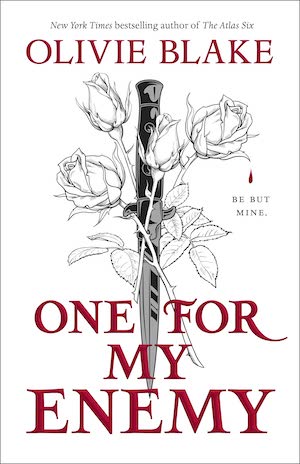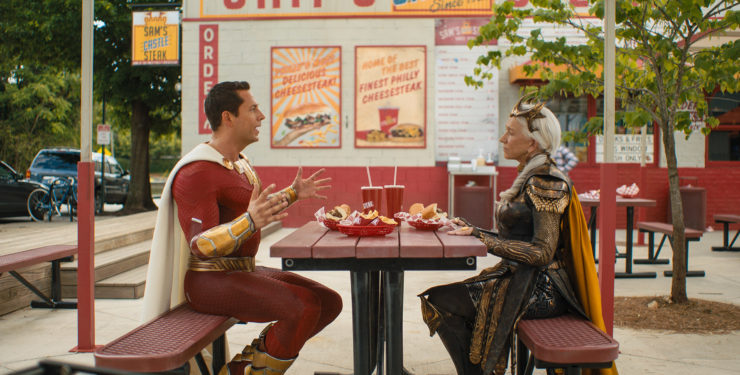It’s been four years and a lot of growing up for the Shazam family (Shazam Fam? ShaFamily? Zamily?), but despite the recent shakeup with the DC film universe and its incoming Gunn-ification, we still have this sequel to contend with. Is it awkward trying to find the middle ground that Shazam and company occupy while its parent studio chucks millions of dollars in multiple directions that will likely never touch what we’re seeing here?
I mean, yeah. That’s really only one piece of the problem, though.
[Spoilers for Shazam! Fury of the Gods]
Remember in the last film when Billy broke that fancy staff in half at the end of the fam’s super fight with Dr. Sivana? (It’s okay if the answer is no, the film will remind you.) Well, that turns out to be a mistake for the sequel, leading to a splinter between realms and the unleashing of the Daughters of Atlas. The trio—yes, there are three despite the film only showing us two to begin with, and the reveal of the third sister being particularly obvious down the line—are angry over being trapped in a dying realm for centuries and mean to rebuild with a seed. Unfortunately, some of them are more bent on revenge for their imprisonment than others….
As this side of the tale builds steam, there’s more trouble at hand on the superhero side of things; Billy’s family isn’t as excited to band together and save the city as they once were, Freddy (Jack Dylan Grazer) keeps nipping off for solo missions in the middle of the night, and Billy (Asher Angel) is panicking over the fact that he’s about to age out of the foster system and will then become a “burden” to the Vasquez family if he stays in their home. This fear is only heightened by sister Mary (Grace Caroline Currey), who projects many of her own fears onto Billy having already reached that age-out point herself—she’s neglected to go to college to continue aiding the super fam (because Philadelphia doesn’t have local colleges, apparently), but also has a job so that she can contribute money to the household.
Buy the Book


One for My Enemy
This is where things get hairy, as the sisters are looking for their seed and expecting to encounter serious champions guarding the Earth, the kids are hiding their super-antics from their parents and a city that is less appreciative than it should be, and growing pains abound. And it’s… fine? Mostly just fine, though. It’s hard to be more excited than that.
If we’re going to delve, there are several logic gaps in the film that might pull a person straight out because they’re goofy enough to prove distracting. For one, Mary no longer has an “adult” super persona when she shazams… presumably because she’s over eighteen? The spell seems to account for that? Which is weird because eighteen definitely wasn’t the coming-of-age number in ancient times when the power was forged by the wizard, right? By this logic, Billy will only be aging up as Shazam for another half year, which is likely not the plan. Letting that go, let’s zoom in on the really obvious issue that pops up often in “high school” films and makes even less sense as time goes on—Freddy gets beat up by two school bullies in the hall toward the start of the film, and a teacher suddenly appears to break up the scene… but nothing happens aside from a glare and sympathy from said teacher. Because in high school, it’s completely okay to assault a disabled student provided he’s still tossing off quippy one-liners about it.
All of this is made more awkward still by the same problem we had in the first Shazam movie—namely that Zachary Levi (as the titular hero) and Asher Angel seem to be playing two completely different versions of Billy Batson. And it’s a shame because Angel’s take on Billy is far more endearing than anything Levi is putting on, and more nuanced to boot, whereas Levi’s iteration relies on nothing but babbling, posturing, and teen clichés to keep it afloat. As a result, it becomes easy to hope the story will find reasons to depower Shazam just for the sake of seeing the more emotionally-competent actor play the character. It’s also jarring for the fact that none of the other adult actors playing the shazamed kids overdo it in the same way; they’re all perfectly on-point being just a little more exuberant or awkward, and allow those choices to speak volumes.
There are deeper emotional thoughts at play in the story that never see the light of day. We have Billy’s fears and Mary’s paralysis, and we even have Freddy’s journey to discover his own internal strength—but the film isn’t subtle enough to handle any of these journeys with the consideration they’re due. The difficulty Freddy has in using his superpower as a means of getting around his disability doesn’t stack because it’s clear that no one writing the script can conceive of the thought that disability doesn’t automatically lead to self-hatred. At one point Freddy insists that he’s “broken” and the powers are a way to distract from that, yet while the film gives him the chance to prove that he’s strong in other ways, it never once considers that Freddy might view his differently-abled body with any emotion other than loathing. There’s also no indication that Freddy feels any broader anger toward his society or even his peers for treating him poorly, which hampers the film’s chances at a more complex depiction.
It’s relevant, too, that for all the troubles going on in the Vasquez household, it’s the three white foster kids who get the most narrative focus and character development. Continuing that thought, it’s also relevant that while Billy finally gets closure from foster mom Rosa (Marta Milans) about his fear of burdening the family, Mary gets none of the same closure. But that’s hardly surprising when you take the broad view of the way that the two Shazam films have depicted women, or, more specifically, how they frame women who are worthy and heroic. It’s notable that all “good” women in these films are mothers or maternal in a broad world-tending sense, and aspire to provide for others (Rosa, Mary, Wonder Woman, and even Helen Mirren’s Hespera by the end), while all “bad” women eschew maternal feeling and are focused on feelings of fear or vengefulness (Billy’s biological mother, Lucy Liu’s Kalypso).
And age plays a factor in how these character’s are handled as well; in Fury of the Gods, the Daughters of Atlas are predictably cast with an eye toward the Maiden-Mother-Crone dynamic, with all of the sisters being relatively the same age (six millennia give or take a few years), but appearing either young (Rachel Zegler’s Anthea), middle-aged (Kalypso), or old (Hespera) according to that template.
Guess which sister is the “good” one?
Good job guessing Anthea. (And, of course, it’s entirely fine for her to date Freddy and for Billy to want to date Wonder Woman because their foster parents give appropriate side-eye over their sons being into “older” women. Because we’re still making this joke, for some reason.)
And yes, the film has its moment of joy and affirming delight, like Darla insisting on becoming the leader of a goth unicorn army, or Steve the sentient pen, or Pedro’s coming out. (As usual, Djimon Hounsou is criminally underused.) It’s great that Billy’s family have to fight for the city of Philadelphia as non-powered kids in the film’s climax, avoiding many of the pitfalls the first film suggested about having a “ideal” super form in order to be a hero (though I’m still at a loss about how anyone is riding mythical equine creatures bareback). It’s just unfortunate that the bigger messages aren’t being given more thought—particularly in a film that’s meant to inspire children.
Shazam!, as before, is cute… but the instant you stop to think about it, the whole thing comes apart.
Emmet Asher-Perrin doesn’t believe they’re going to make a third Shazam fam film. They’ll believe it when they see it. Hopefully we don’t get a Batman cameo? That seems like the next logical one, but it would just be so awkward. Send Robin instead. You can bug them on Twitter and Tumblr, and read more of their work here and elsewhere.











They won’t be making a 3rd one. The 2nd one is bad, will not make money, and the studio is going to sideline a lot of projects while they make a plan to rival Marvel. Which will fail because DC.
@1 Which will fail because DC.
I expect you’re right, but DC’s live-action failures always leave me a little puzzled (even as I’ve come to expect them), because their animated super-hero works (produced mostly by Warner Bros. Animation) have generally ranged from good to superb. For decades, they’ve had these great examples of how to do superheroes right, with their own IP, staring them in the face. And.. whoosh, apparently.
@1. ragnarredbeard: It’s possible the Big Change at DC will only lead to further trouble, but it’s equally possible that the Distinguished Competition will surprise us in a Good way (it bears pointing out that, while the DCEU as a whole has made rough going of a shared universe, at least two of it’s films have done remarkably well – and that there’s more to Live Action DC than than their attempts at a Shared Universe, even in this century).
@Emmet Asher-Perrin: I honestly liked this film (since it still knows how to show audiences a Good Time), though it felt perhaps a little too wild at points, to the point where it might have been wiser to cool things down a little.
I think a key issue is Too Many Characters (or at least Too Many Stars) syndrome: finishing something useful for every member of the cast to do must have been hellishly difficult and that’s reflected in the finished film.
On the other hand I either liked or outright loved the characters, so it’s not all bad (and at least there’s no Villain Problem: if you want to convince me that characters are not only Evil but Irredeemably Evil, murdering Mr Dietrich Bader is the way to go).
I’m glad that I’m not the only person who thought Angel out-acted Levi in the first one.
Seriousl:
Unpowered Billy wants to find his mother and regain what he thinks he lost.
Powered Billy wants to be in selfies and show off by charging people’s phones?
And nobody saw the dichotomy here?
Having seen the film, it just feels strange. Why they didn’t use Mr Mind seems weird. The disconnect between Billy and his other form gets worse. They focus on Freddy (which is fine) but then kill Billy for two minutes, seemingly to justify the cameo, and expect it to matter because of an undersold idea that Billy can’t be part of the foster family that isn’t shown to be built in anything. There’s tonal whiplash, particularly around the egregious product placement, and most of the comedy and acting just feels like everyone was very tired and fulfilling a contract. There were okay moments but I just felt disengaged to the point where I said to my friend, I think I’ve outgrown this now.
@6: Oy, the product placement! You have to say the product’s tagline twice? (The second time was admittedly awesome, but think how much more awesome if that was the only time you heard it?)
(BTW, I will give the filmmakers credit for making unicorns the kings of the mythological jungle. They Who Rule Above All! Terrifying forces of nature who live only to see their enemies driven before them. That bit was hilarious. You know, I’ve read that idea elsewhere, but darned if I can recall where.)
Further evidence that cheese-steak is far inferior to shwarma.
Shazamily?
@7
Equoid, perhaps?